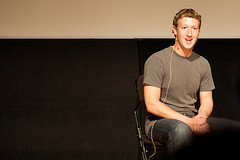Jan 28, 2011 Comments Off on Sean Parker, Mark Zuckerberg, and the Size of Numbers
Sean Parker, Mark Zuckerberg, and the Size of Numbers
 In a recent interview with the Googliest leather-clad author around, Paul Coelho, Napster founder Sean Parker called The Social Network “a complete work of fiction.”
In a recent interview with the Googliest leather-clad author around, Paul Coelho, Napster founder Sean Parker called The Social Network “a complete work of fiction.”
While I could write a book about that last statement, the thing that jumped out at me in the Mashable write-up just referenced was a quote attributed to Mark Zuckerberg.
Apparently, when asked if he liked The Social Network, Zuckerberg responded by focusing not on its fictionalization of a reality that he has supposedly lived but rather on the size of its audience saying, “We build products that 500 million people see… If 5 million people see a movie, it doesn’t really matter that much.”
Let me just repeat that last line: “If 5 million people see a movie, it doesn’t really matter much.”
Is that true? Can it really “not matter much” if 5 million people all engage in the same activity? Of course it could be true given that 7 billion humans live on this planet. I mean, how much can the isolated actions of .07% truly matter?
If human beings are merely ciphers—numbers, eyeballs, data points—then I guess we can play a purely quantitative game and determine what really matters by simply doing the math. Billions of people have looked at McDonald’s hamburgers (most following this period of observation with the act of consumption), so they must matter more than the hundreds of millions who have looked at Facebook, right? In fact, the Facebook-seers are basically a subset of the hamburger-seers, so, if we want to understand the world and how it works, we ought to by rights spend more time focusing on the latter instead of the former.
Of course, numbers are themselves merely ciphers. They don’t have a meaning in and of themselves nor does the comparison of any two numbers have any particular meaning in itself. What meaning might be had from such comparisons depends less on the counting than on what got counted.
As far as the what behind the numbers goes, how much sense does it make to compare the number of people who have “looked at” Facebook to the number of people who have looked at a particular movie? Wouldn’t it make more sense to compare it to the number of people who have looked at movies in general? I don’t have the numbers in front of me, but I would wager that many more people have seen movies than have looked at Facebook (and that all people who have seen Facebook have seen movies, while the opposite certainly does not hold). Does that mean that Facebook “doesn’t really matter that much”?
The answer to that question has to be, “No.” Facebook is more important and will have a more lasting impact on our culture than the relatively well-made feature film on its origins (which is not to say that Facebook will have a more lasting impact than movies, generally speaking). Why? Because Facebook is a medium, like film, and not a mediated object, like a movie (though, to stick with a strictly McLuhanesque taxonomy, we’d have to acknowledge that Facebook too is a mediated object insofar as it is accessed via a meta-medium like the Web).
For the same reason, I believe that the printing press has had a more lasting impact on human culture than any book printed on it, even though many more people have seen said books than have ever actually seen a printing press.
Image Source: Mathieu Thouvenin.
 I’m at the Facebook sesh featuring “the Pied Piper of Social Media,”
I’m at the Facebook sesh featuring “the Pied Piper of Social Media,”